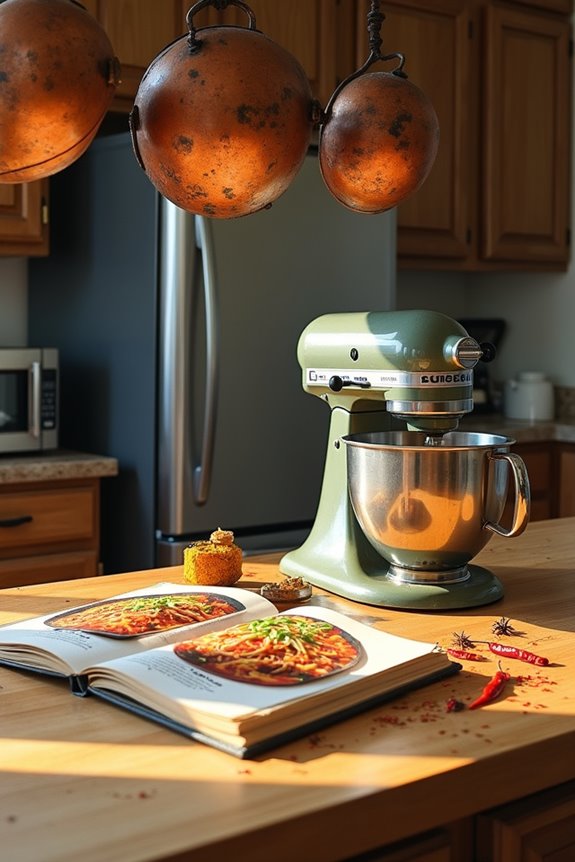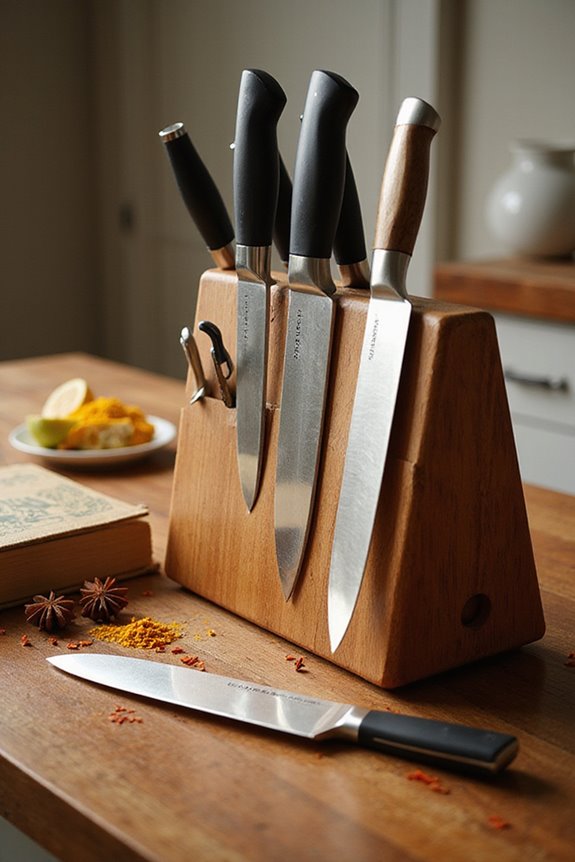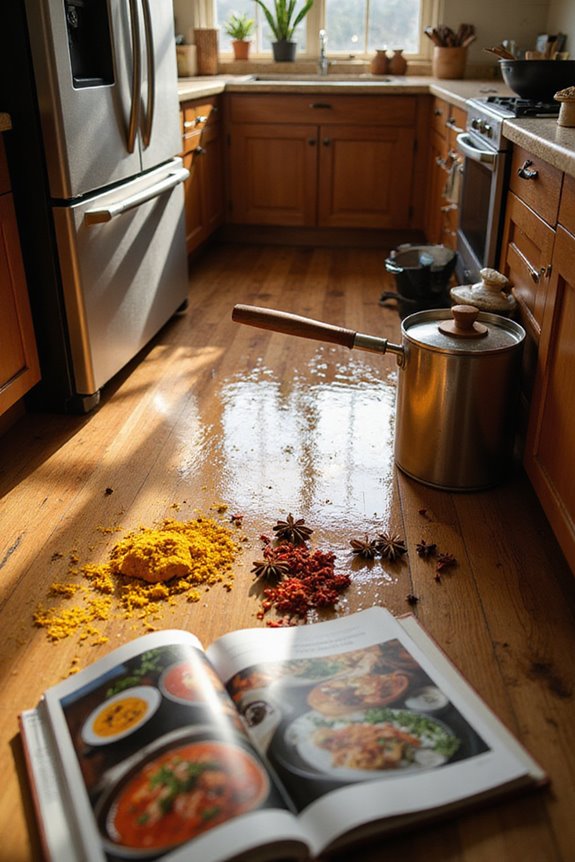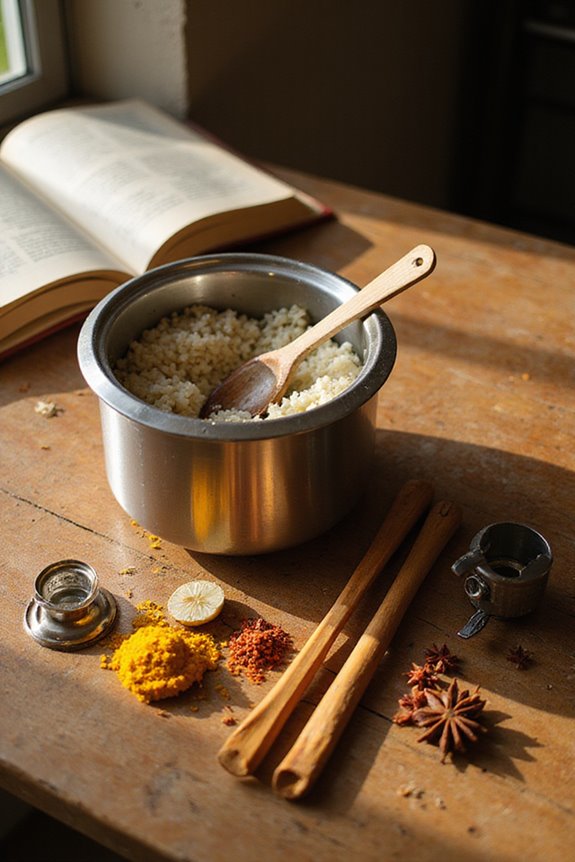When we’re talking about the average lifespan of kitchen appliances, it’s truly magical! Large appliances like microwaves usually last about 9 years, while dishwashers hang around for 9 to 16 years. Refrigerators rock on for 13 to 19 years, and ovens can last a whopping 13 to 23 years—perfect for holiday baking! To keep these delightful gadgets in tip-top shape, regular maintenance is key. Stick with us to discover even more tips and tricks for appliance longevity!
Key Takeaways
- Microwaves typically last around 9 years, reflecting their usage and technology dependency.
- Dishwashers can last 9 to 16 years, influenced by maintenance practices.
- Refrigerators generally have a lifespan of 13 to 19 years, varying by brand and model.
- Ovens can endure between 13 to 23 years, ideal for cooking during holidays and special occasions.
- Small appliances usually have shorter lifespans of about 9 years, often due to complex features and regular use.
Lifespan of Large Kitchen Appliances
When we talk about the lifespan of large kitchen appliances, it’s like uncovering the secret to a successful cooking adventure! Understanding how long these delightful machines last can make us feel more in control. Here’s a quick breakdown:
- Microwaves: 9 years on average.
- Dishwashers: 9 to 16 years, depending on love and care.
- Refrigerators: 13 to 19 years, depending on the brand.
- Ovens: 13 to 23 years, perfect for our holiday feasts!
Don’t forget energy efficiency ratings! Choosing quality kitchen appliance brands not only makes cooking magical but saves on bills. Regular maintenance and timely repairs can keep these culinary champions in our kitchens longer, bringing joy into every meal we whip up! Investing in appliances with Fuzzy Logic technology can enhance cooking versatility and boost their longevity.
Lifespan of Small Kitchen Appliances
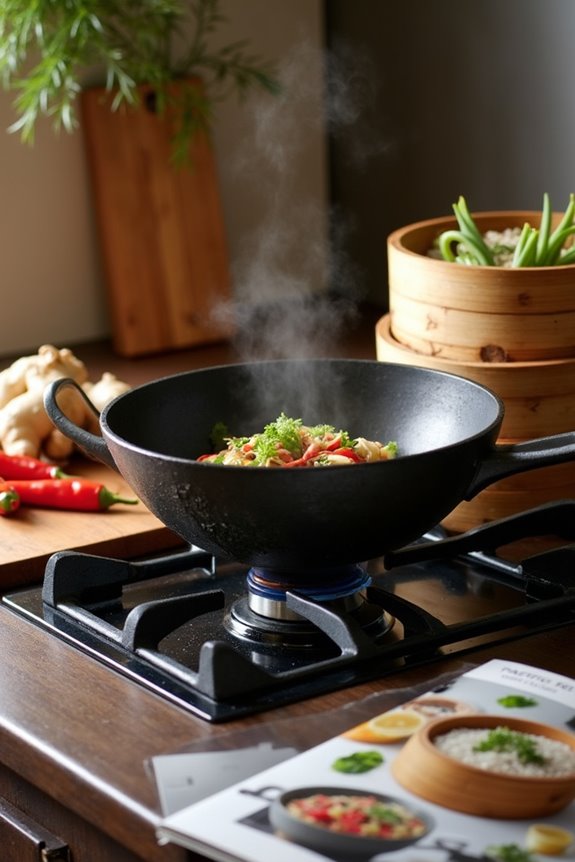
Small kitchen appliances bring a sprinkle of convenience and fun to our cooking escapades! These handy gadgets, like microwaves and blenders, usually have shorter lifespans—like just nine years for a microwave. High-tech features can make them trickier to fix, and while we love shiny new models, we might find that replacement rates are rising, thanks to evolving consumer behavior. To make our dear appliances last longer, we should:
- Maintain and clean them regularly.
- Store them properly after those holiday baking marathons.
- Use them as directed to avoid overworking them. Additionally, ensuring that high-temperature cooking equipment is not overused will help prevent wear and tear on essential appliances.
Trends in Appliance Lifespan Changes
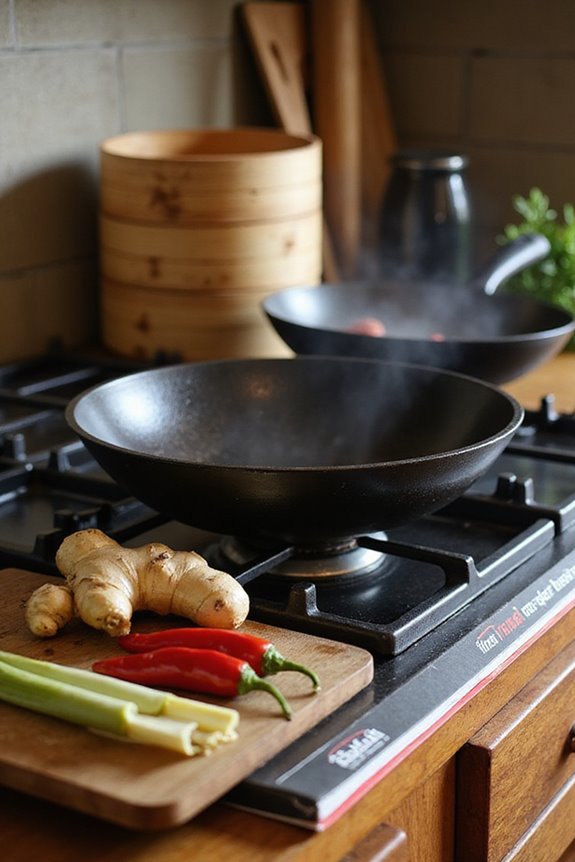
As we plunge into the delightful world of kitchen appliance lifespans, it’s exciting to see how trends are shaping our cooking companions! Appliance innovation trends are taking off, especially with smart devices that make our lives easier. Think fridges that suggest recipes and dishwashers that optimize energy use—talk about magical kitchen helpers!
We’re noticing consumer behavior shifts too. With high mortgage rates slowing sales, more folks are replacing old appliances instead of buying new. This means your trusty oven might just stick around a bit longer, especially when it looks fabulous alongside sleek cabinetry.
To stay trendy and eco-friendly, remember to choose appliances that align with both style and sustainability. Rice cookers with fuzzy logic technology can enhance your cooking experience and adapt to your culinary needs. Let’s embrace these changes together!
Factors Affecting Kitchen Appliance Longevity
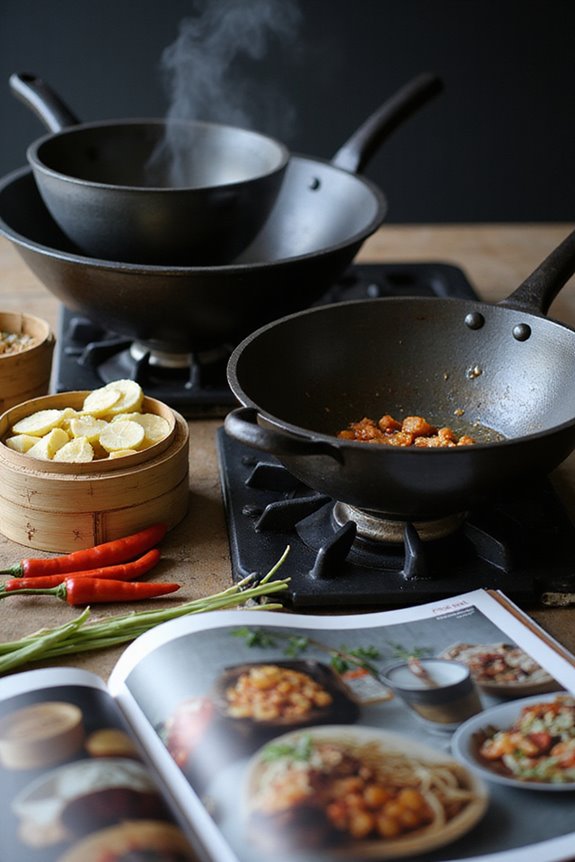
Understanding the factors that influence the longevity of our kitchen appliances is essential for ensuring these delightful devices stick around to help us whip up magical meals! Here are some key points to contemplate:
- Water Quality: Hard water can create mineral buildup in dishwashers and water heaters, accelerating wear. Using a water softener could work wonders!
- User Handling: Regular maintenance—like cleaning filters and avoiding overloading—makes a big difference. Using the right settings helps keep our appliances happy!
- Usage Patterns: Appliances getting daily love wear down faster. Moderating their usage can extend their lifespan. Additionally, selecting appliances with quality materials ensures durability and performance, ultimately enhancing their longevity.
Specific Appliance Lifespans
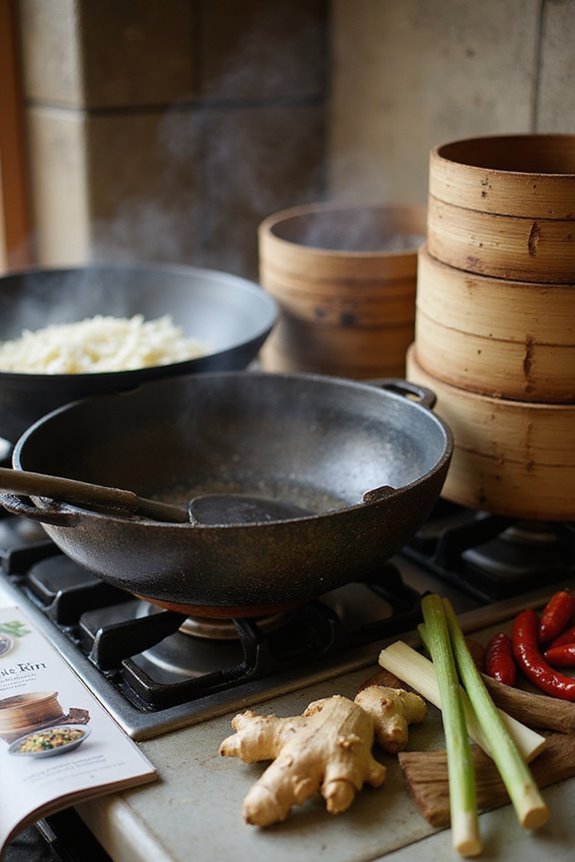
With our trusty kitchen appliances working hard day in and day out, it’s important to know how long we can expect them to stay by our side. Let’s take a quick look at their lifespans:
- Refrigerators: Usually last 9 to 14 years.
- Dishwashers: Their longevity averages around 9 years.
- Gas Ranges: These can delight us for 15 to 17 years.
Isn’t it magical that our fridges tend to be long-lasting companions? Not to forget, freezers often outlive them, with a lifespan of 10 to 20 years. Keeping these appliances clean and well-used can help us get the best out of their refrigerator lifespan and dishwasher longevity. Interestingly, just as we appreciate sustainable alternatives in our bathroom choices with bamboo toilet paper, maintaining our kitchen appliances mindfully can extend their useful life. So let’s cherish our kitchen friends and enjoy every cooking adventure!
Maintenance Tips for Extending Lifespan
To keep our delightful kitchen appliances running smoothly for years, a little maintenance goes a long way! With some fun preventive maintenance, we can make our kitchen feel magical. Establishing enjoyable cleaning schedules helps us stay on track, so let’s aim for:
- Monthly checks: Wipe down surfaces and clean microwaves inside and out.
- Every 6–12 months: Vacuum refrigerator coils to keep them and our electric bills happy.
- Quarterly deep cleans: Let’s bust out the steam cleaner for an appliance spa day!
Don’t forget to tune up our fridge seals and oven doors for exceptional efficiency. By treating our appliances with love, we can keep the culinary magic alive and well for many family feasts to come! Additionally, using products with Fuzzy Logic technology can help enhance the cooking experience of our specialized kitchen appliances.
Impact of Usage Intensity on Lifespan
When we whip up delicious meals, our trusty kitchen appliances are right there with us, but did you know that how often we use them can really impact their lifespan? The more we cook, the harder our appliances work, leading to different usage patterns and wear rates. For instance, a coffee machine used daily might only last four years, while one used occasionally could go for much longer.
To keep our kitchen friends in tip-top shape, consider these tips:
- Use appliances within their limits.
- Schedule regular maintenance checks.
- Keep an eye out for unusual sounds or leaks.
Technological Complexity and Appliance Durability
Technological complexity in our kitchen appliances can feel magical, but it also comes with a few tricks that can affect their durability. With features like digital controls and smart appliances, we’re often dazzled by what they can do. However, this advancement comes at a cost! Electronic failure can happen more quickly, and repair costs can skyrocket. Plus, don’t forget those pesky software updates that can confuse even the most seasoned cook.
To keep our devices running smoothly:
- Regularly perform maintenance to avoid service complexity.
- Watch out for design vulnerabilities that can cause issues down the line.
- Embrace simple appliances when possible—they often last longer!
Cooking should be delightful, so let’s keep our trusty gadgets in tip-top shape!
Cost Implications of Appliance Lifespans
Understanding the cost implications of appliance lifespans is essential for savvy cooks like us. When we think about cost efficiency, longer-lasting appliances like fridge-freezers stretching around 10 years start to make more sense. Sure, some lower-priced gadgets like kettles and air fryers sound tempting, but their shorter lifespans mean more replacement frequency and higher long-term costs.
Key Takeaways:
- Fridge-freezers: Average £586, last 10 years.
- Kettles: £51, last 4.4 years; can be pricey in the long run!
- Microwave ovens: Lower cost with moderate lifespan (~9 years).
Frequently Asked Questions
How Do I Know When to Replace My Appliance?
We’ve all experienced that moment when our appliance shows clear signs it’s time for replacement. Let’s look for indicators like performance drops or strange noises together—it’s our subtle call to upgrade for better efficiency.
Are Extended Warranties Worth It for Kitchen Appliances?
When considering extended warranties, we should evaluate their benefits against potential repair costs. A thorough appliance insurance comparison helps us determine if the security they offer aligns with our kitchen appliance needs and usage habits.
What Brands Are Known for Longevity in Kitchen Appliances?
When it comes to longevity in kitchen appliances, we can’t ignore Bosch reliability and Whirlpool durability. These brands, with their reputation for lasting craftsmanship, are cherished by many families, making our kitchens feel truly complete together.
Can I Repair an Appliance Myself or Should I Hire a Professional?
When deciding on DIY repairs versus professional services, we should consider our comfort level and the repair’s complexity. Sometimes, we can tackle simple fixes ourselves, while other times, it’s wiser to call in the experts.
What Recycling Options Are Available for Old Appliances?
What do we do with our old appliances? We can donate them to shelters or recycle them at metal centers. Together, let’s guarantee they’re disposed of responsibly, making our community a cleaner, greener place for all.

